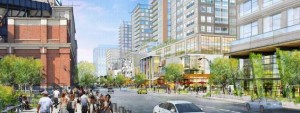Public trust doctrine did not apply to Willets Point West development project. On August 15, 2014, the New York Supreme Court in Manhattan denied petitions for declarative and injunctive relief against the Willets Point Development Project in Queens. The petitions were brought by a coalition led by New York State Senator Tony Avella, The City Club of New York, and New York City Park Advocates. The petitioners argued that constructing a shopping mall and hotel was an improper use of the Willets Point West parkland, and that it should remain open for public events including circus performances and concerts.
On August 21, 2013, the City Planning Commission approved an application to construct a 10-story, 200-room hotel and a 30,000-square foot mall complex on the Willets Point West site, brought by the New York City Economic Development Corporation and by Queens Development Group, LLC., a joint venture of Sterling Equities and Related Companies. On October 9, 2013, the application was approved by the full City Council in a 42-3 vote. (See CityLand’s past coverage here.) Willets Point West is a 23-acre area bordered by Citi Field to the east, Roosevelt Avenue to the south, and Shea Road to the west and north. The site lies within Queens Community Board 7, and was the north end of Flushing Meadow Park before the construction of Shea Stadium in 1961. Since the stadium’s demolition in 2009, the site has served as a parking lot for Citi Field, but remains classified as parkland.
On February 10, 2014, Senator Avella and the advocacy groups filed a petition for declaratory relief stating that the City Council’s approval of the project was void for failing to abide by ULURP. The petitioners also sought a declaration that building the mall and hotel violated the public trust doctrine by using designated parkland for private purposes, and sought an injunction against Queens Development Group from continuing with construction of the mall and hotel. At filing, Senator Avella stated “Parks are intended to serve the people, to provide open space, landscaping, opportunities for recreation, playgrounds for children, and escape from the hordes and noise of a busy commercial city. …I’m outraged when the people who are supposed to administer parks for everyone turn them over to private interests without seeking the State Legislature’s consent as the public trust doctrine requires.”
On August 15, 2014, Justice Manuel J. Mendez of New York Supreme Court in Manhattan denied declarative relief and the injunction on the grounds that the public trust doctrine does not apply when the use of parkland has existing legislative approval. New York City Administrative Code §18-118 authorized Shea Stadium’s construction in 1961 and enumerated several purposes for the use of Willets Point West, including improvement of trade and commerce, and Justice Mendez ruled that constructing a shopping mall qualifies for that purpose. Justice Mendez also ruled that since the Administrative Code specifically authorized the particular use of this land, it is not subject to ULURP.
The coalition expects to appeal this decision. Michael Gruen, President of the City Club of New York stated, “the bottom line is that decision is wrong. We just have to establish that at a higher level. We knew all along that either way the final decision would be made on appeal and not with the lower court. We are extremely grateful for what the coalition has done, and for their commitment to continuing the fight.”
Avella v. City of New York, Index No. 100161/14 (N.Y. Sup. Ct. Jul. 30, 2014) (Attorneys: John Low-Beer, for Avella; Zachary W. Carter, for NYC).
By: Michael Twomey (Michael is a CityLaw Fellow and a New York Law School Graduate, Class of 2014).


